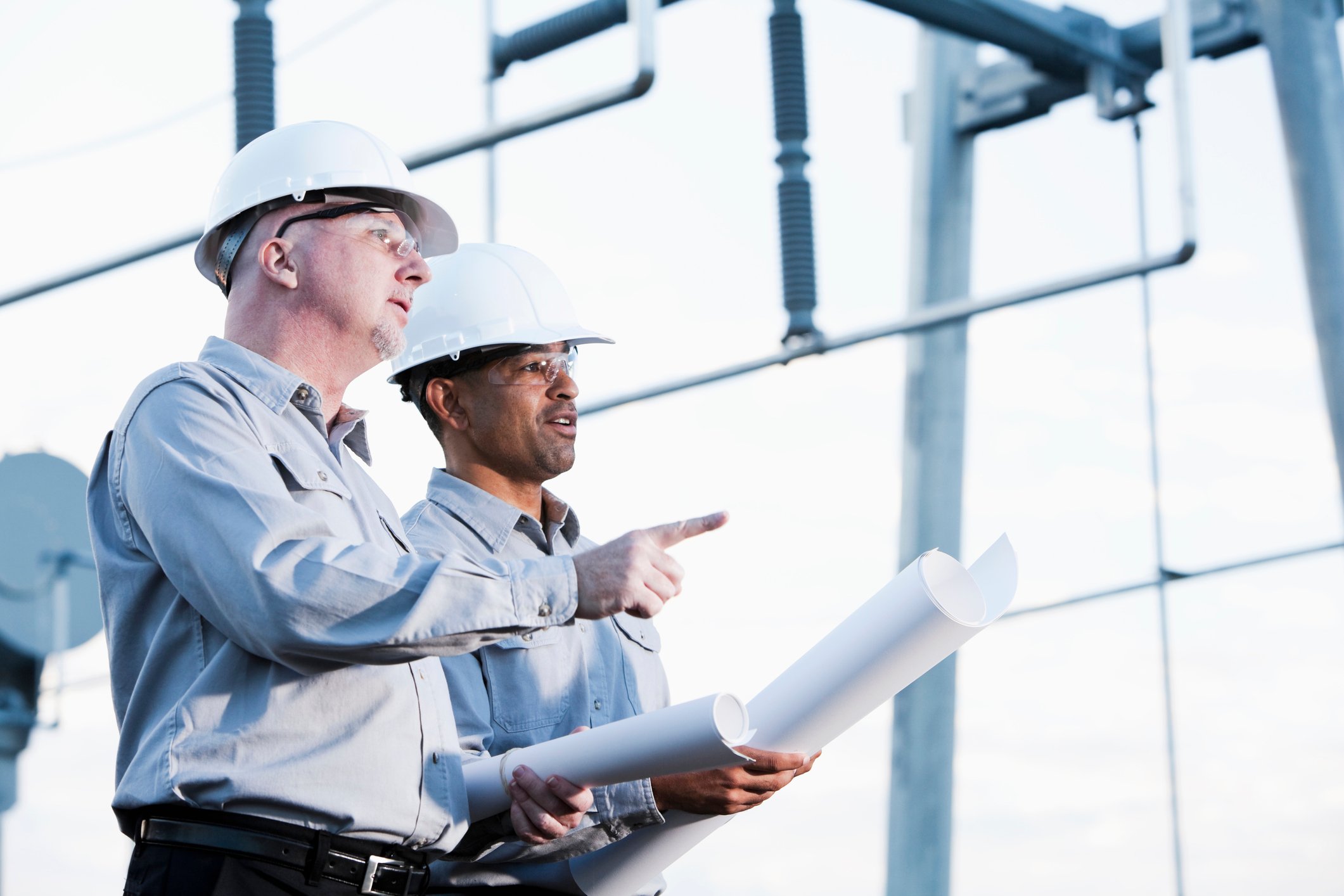A heating, ventilation, and air conditioning (HVAC) engineer designs, installs, and maintains heating, ventilation, and air conditioning engineering systems in buildings. These can include HVAC systems in offices, stores, factories, transportation facilities such as airports and train stations, schools, hospitals, and homes.
HVAC engineers design HVAC systems that meet the specific requirements of the building type. This includes calculating heat load and airflow requirements, selecting appropriate equipment and components, and designing ductwork and piping systems. They must select appropriate equipment such as boilers, chillers, air handlers, and other components for those particular HVAC systems. They do this by evaluating equipment specifications, performance, and efficiency, and making recommendations based on the needs and budget available.
HVAC engineers also oversee the installation of HVAC systems to ensure that they are installed according to design specifications, code requirements, and industry standards. They work with contractors, technicians, and other professionals to ensure that the installation is done correctly. After installation, HVAC engineers perform testing and commissioning to ensure that the system is operating correctly and efficiently. They perform functional tests, airflow tests, and other measurements to verify that the system is performing according to design specifications.
HVAC engineers are furthermore responsible for maintaining and troubleshooting HVAC systems. They perform regular maintenance to ensure that the system is operating efficiently and identify and troubleshoot issues that arise, such as equipment failures, refrigerant leaks, or airflow problems.
In designing and maintaining HVAC systems that are energy-efficient and cost-effective, they must be aware of energy-saving measures too. Such measures include upgrading equipment, optimizing system controls, or implementing renewable energy systems.
With the continued growth in building worldwide, HVAC engineers are always in demand. They are typically employed by engineering, construction and real estate companies, or other service-providing companies who offer HVAC solutions.
Apply now for a job as a HVAC engineer!
HVAC Engineer
Location: Groningen
Branche: Renewable Energy
Expertise: Transport & Logistics
Experience: 5 years
Als Project Engineer HVAC ben je vanaf het begin betrokken bij het ontwerp en de realisatie van verwarmings-, ventilatie- en luchtbehandelingssystemen. Je werkt binnen een multidisciplinair team van specialisten en stemt regelmatig af met collega's op andere locaties. Je standplaats is Groningen, met hybride werkmogelijkheden. Je belangrijkste taken: Je ontwerpt HVAC-installaties voor zowel procesinstallaties als gebouwgebonden toepassingen binnen de duurzame energie-infrastructuur. Je begeleidt ingenieursbureaus en leveranciers, beoordeelt rapportages en controleert technische berekeningen. Je bereidt aanbestedingen voor, voert de selectie uit en begeleidt de bouw van HVAC-systemen. Je werkt mee aan de standaardisatie van processen en installaties binnen de energietransitie. Je bent betrokken bij meerdere projecten tegelijk, van concept tot inbedrijfstelling.
Techniker Planung und Projektierung HVAC/HKL (w/m/d)
Location: Neubrandenburg
Branche: Machine & Plant Design
Expertise: Research & Development
Experience: 2 years
In Ihrer Position dreht sich alles rund um die Planung und Projektierung von Lüftungstechnik. Dabei berechnen Sie den Luftbedarf sowie deren Konditionierung. Zudem erstellen Sie Konstruktionen mittels RUKON. Unter Einhaltung sicherheitsrelevanter Vorgaben planen Sie Entrauchungsanlagen. Sie prüfen Unterlagen der Leistungsphasen 3 und 5 auf technische Mängel und Plausibilität. Je nach Erfahrungsstand übernehmen Sie die fachliche sowie disziplinarische Führung. Ihr Kommunikationsgeschick nutzen Sie für die erfolgreiche Zusammenarbeit mit Bauherren, Fachplanern und Architekten.
Control & Protection Engineer for HVDC Studies - proaktiv (w/m/d)
Location: Ingolstadt
Branche: Conventional Energy
Expertise: Planning & Testing
Experience: 2 years
Entwicklung und Implementierung von Steuerungssystemen für HVDC-Anlagen zur effizienten und sicheren Energieübertragung Gestaltung und Optimierung von Schutzstrategien, um die Systemstabilität und -sicherheit in verschiedenen Betriebsszenarien zu gewährleisten Durchführung von Simulationen und Leistungsanalysen zur Bewertung der Effizienz, Stabilität und Zuverlässigkeit von HVDC-Systemen Sicherstellung der nahtlosen Kompatibilität von HVDC-Anlagen mit bestehenden AC-Netzen, inklusive Netzintegration und -stabilität Erstellung technischer Dokumentationen, Berichte und Analysen zur Unterstützung von Projektentwicklungen und zur Sicherstellung der Transparenz Enge Zusammenarbeit mit interdisziplinären Ingenieurteams, um technische Lösungen abzustimmen und die Projekte erfolgreich umzusetzen
Commissioning Specialist (Mechanical, HVAC & Piping)
Branche: Conventional Energy
Expertise: Production & Manufacturing
Experience: 5 years
Permit to Work and Lock-Out Tag-Out Procedures: Always ensure that you follow these procedures meticulously to maintain safety and prevent accidents. This involves isolating energy sources and ensuring that machinery cannot be operated while maintenance is being performed. Condition Monitoring: Use test equipment such as vibration analyzers, thermal cameras, and ultrasonic detectors to monitor the condition of machinery. This helps in identifying potential issues before they become serious problems. Project Drawings: Familiarize yourself with various types of drawings. Single Line drawings show the electrical distribution, Block Diagrams provide a high-level overview of system components, General Arrangement Drawings depict the physical layout, and schematics show detailed connections and components. Project Documentation: Understand and follow procedures outlined in project documentation. This includes Mechanical Completion (MC) and Pre-Commissioning (PC) procedures, tagging and punchlist procedures, and ensuring that As Built documentation accurately reflects the final state of the project. Pre-Commissioning Inspection: Perform thorough checks on equipment to ensure it meets specifications and is ready for commissioning. This includes verifying installation, checking for damage, and ensuring all components are correctly configured.
Inbetriebnehmer Heizung/Klima/Lüftung - Schiffssysteme (w/m/d)
Location: Bremen
Branche: Shipbuilding
Expertise: Production & Manufacturing
Experience: 2 years
Inbetriebnahme von HVAC-Systemen: Sie sind verantwortlich für die Inbetriebnahme und das Testen projektbezogener Heizungs-, Klima- und Lüftungssysteme an Bord moderner Schiffe. Erprobung und Probefahrten: Sie begleiten Messungen, Erprobungen und Probefahrten - bis zur erfolgreichen Übergabe an den Kunden. Fehlersuche und Lösungen: Bei Störungen analysieren Sie die Ursache und entwickeln passende Lösungsansätze. Schnittstelle zu Ansprechpartnern: Sie stehen in direktem Austausch mit Kundenvertretern, Lieferanten, Behörden, Klassifikationsgesellschaften und Flaggenstaaten. Koordination von Fachbereichen: Sie arbeiten eng mit verschiedenen technischen Abteilungen zusammen und sorgen für einen reibungslosen Ablauf. Planung der Inbetriebnahme: Sie planen Ihre Inbetriebnahmen eigenständig und behalten Termine und Abläufe im Blick. Rückmeldung an die Konstruktion: Ihre Erfahrungen fließen direkt in den Verbesserungsprozess ein - für noch bessere Lösungen in der Zukunft.
Common HVAC engineer responsibilities
An HVAC engineer is responsible for performing a range of tasks. Responsibilities may include:
- Conducting research on new technologies to develop efficient HVAC designs;
- Providing technical support to other engineers on projects or issues related to HVAC;
- Calculating, designing, constructing, and maintaining heating, ventilation, and air conditioning for residential, public, and commercial buildings;
- Analyzing building plans to determine the HVAC unit number for each building type and room or floor of the building;
- Evaluating customer needs and recommending solutions in line with them;
- Determining the best place for installing HVAC equipment in a building;
- Coordinating with contractors to ensure new installations meet building codes and regulations on time;
- Working with contractors to ensure existing HVAC systems are working properly;
- Inspecting chillers, boilers, air handling units, and refrigeration equipment;
- Traveling to sites to design, install, maintain HVAC systems;
Ensuring the safety of everyone at all times.
Qualifications for HVAC engineers
HVAC engineers should possess at least a Bachelor's degree in HVAC Engineering, Mechanical Engineering, or a related field. In some countries, a professional certification may be required.
Additional supporting skills and experience include:
- Some prior experience with heating, ventilation, and air conditioning, building design, or mechanical-electrical systems, including from an internship or apprenticeship is recommended;
- Strong understanding of buildings and construction;
- Ability to use diverse tools and machines;
- Strong team collaboration and customer service skills;
- Logical thinking skills and attention to detail.



